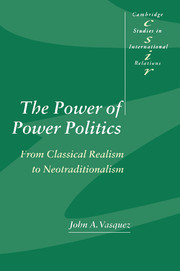Book contents
- Frontmatter
- Contents
- List of figures
- List of tables
- Preface
- Introduction
- Part I The Original Text: Classical Realism and Quantitative International Politics
- Part II Neorealism and Neotraditionalism: International Relations Theory at the Millennium
- 9 Retrospective: neorealism and the power of power politics
- 10 The promise and potential pitfalls of post-modernism: the need for theory appraisal
- 11 The realist paradigm as a degenerating research program: neotraditionalism and Waltz's balancing proposition
- 12 Mearsheimer's multipolar myths and the false promise of realist policy prescriptions: the empirical inaccuracy of the realist paradigm
- 13 Challenging the relevance and explanatory power of the realist paradigm: the debate on the end of the Cold War
- 14 Conclusion: the continuing inadequacy of the realist paradigm
- References
- Name index
- Subject index
- CAMBRIDGE STUDIES IN INTERNATIONAL RELATIONS
13 - Challenging the relevance and explanatory power of the realist paradigm: the debate on the end of the Cold War
Published online by Cambridge University Press: 22 September 2009
- Frontmatter
- Contents
- List of figures
- List of tables
- Preface
- Introduction
- Part I The Original Text: Classical Realism and Quantitative International Politics
- Part II Neorealism and Neotraditionalism: International Relations Theory at the Millennium
- 9 Retrospective: neorealism and the power of power politics
- 10 The promise and potential pitfalls of post-modernism: the need for theory appraisal
- 11 The realist paradigm as a degenerating research program: neotraditionalism and Waltz's balancing proposition
- 12 Mearsheimer's multipolar myths and the false promise of realist policy prescriptions: the empirical inaccuracy of the realist paradigm
- 13 Challenging the relevance and explanatory power of the realist paradigm: the debate on the end of the Cold War
- 14 Conclusion: the continuing inadequacy of the realist paradigm
- References
- Name index
- Subject index
- CAMBRIDGE STUDIES IN INTERNATIONAL RELATIONS
Summary
The ending of the Cold War is the most dramatic historical event of recent times, and the realist paradigm has failed both to explain and to anticipate it. This is important because in the social sciences such failures have had major psychological impacts on thinking (see p. 73 above). Logically, a single dramatic historical event is only one case, but psychologically, for a discipline that lacks scientific rigor, it is nevertheless unsettling. It raises serious questions about whether the paradigm (and its theoretical variants) are an adequate guide to the world, either intellectually or in terms of policy (see Kratochwil 1993). Such a failure presents dramatic evidence that the paradigm's understanding about the world may be fundamentally wrong. What history is revealing is not simply an incompleteness or lapse, but a piece of evidence so clear and so bald in its contradiction of theory that it cannot be ignored. This naturally makes one wonder whether there may be other historical events of significance that are being ignored or obfuscated by the paradigm.
These are serious concerns for any paradigm, on two grounds. First, if, in fact, a paradigm has failed to anticipate or explain a major historical event, then in what sense is the knowledge it is providing of any great relevance? The failure of scholars guided by realism to anticipate the ending of the Cold War, and particularly the manner in which it would end, speaks volumes about the ability of the paradigm to help understand change.
- Type
- Chapter
- Information
- The Power of Power PoliticsFrom Classical Realism to Neotraditionalism, pp. 317 - 368Publisher: Cambridge University PressPrint publication year: 1999

